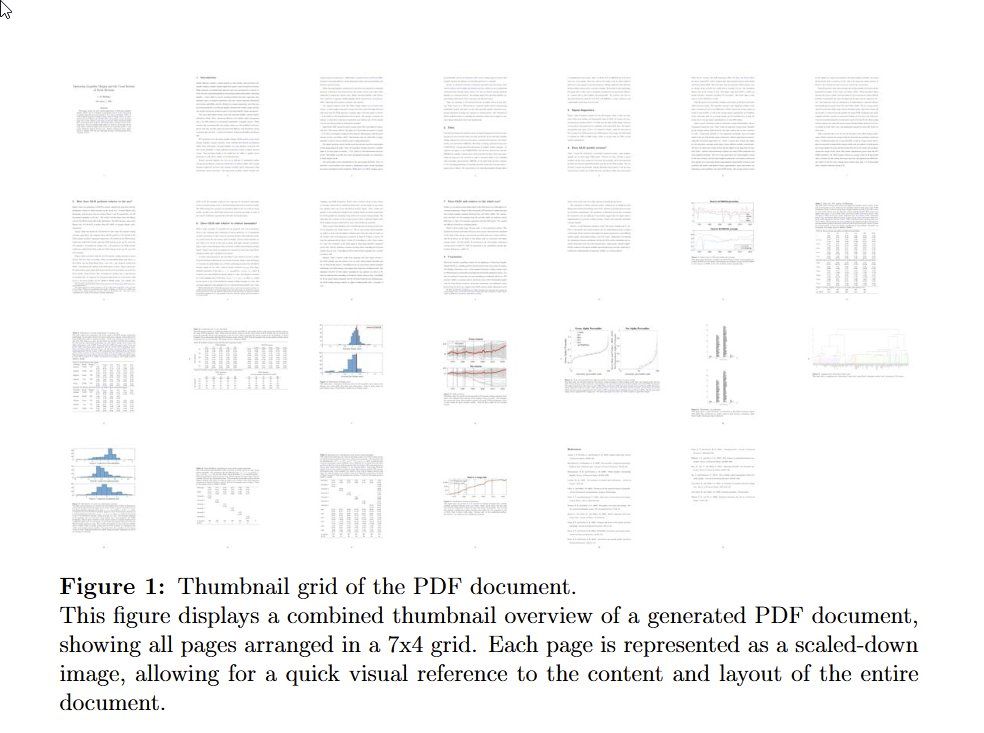
Leveraging 30,000 stock predictors and AI to generate 288 finance papers with custom hypotheses, highlighting risks of automated research and HARKing (Hypothesizing After Results are Known) in academia, from Robert Novy-Marx and @VelikovMihail https://www.nber.org/papers/w33363
22.01.2025 20:30 — 👍 10 🔁 3 💬 1 📌 0
Agree completely! One point was to show how close you get with simple prompts. We are working on quantifying and fixing the hallucinations though that will take more work. But even with the current state of agentic AI a lot of the remaining issues I think are fixable, let alone with what comes next.
19.12.2024 06:55 — 👍 0 🔁 0 💬 0 📌 0
Thank you, @amanela.bsky.social! We did consider that, but decided against it due to the ethical considerations and the strain it would have brought on editors and referees. I'm pretty sure they could be published somewhere. I was super curious though how high up the ladder they would have made it.
19.12.2024 06:08 — 👍 0 🔁 0 💬 1 📌 0
Very excited to release a major revision to our paper on algorithmic collusion by large language models.
#EconSky
28.11.2024 02:30 — 👍 28 🔁 4 💬 1 📌 0
Thanks for featuring our work, Ethan!
18.12.2024 16:23 — 👍 3 🔁 0 💬 0 📌 0
Really cool work that raises questions about how we think about science and progress. The push towards pre registration has benefits but foregoing HARKing has many costs too. The optimal balance is not obvious!
17.12.2024 14:40 — 👍 2 🔁 1 💬 0 📌 0
Cool results that raise interesting questions about a swath of asset pricing papers. Also really like the assaying framework they use.
17.12.2024 03:28 — 👍 4 🔁 1 💬 0 📌 0
In the paper we raise further questions about research integrity and evaluation that reflect the realities of AI-enabled research production and give some initial thoughts on ways to address those.
17.12.2024 03:02 — 👍 3 🔁 0 💬 1 📌 0
Key implication: When AI can rapidly produce plausible hypotheses for any empirical finding at unprecedented scale, how do we ensure quality control in academic research?
17.12.2024 03:02 — 👍 2 🔁 0 💬 1 📌 0
Another version for the OLM signal invokes production-based asset pricing arguments and cites Cochrane (1992) and Zhang (2005). While the stories are not always flawless, they are remarkably coherent, especially considering the scale at which we can produce them.
17.12.2024 03:02 — 👍 1 🔁 0 💬 1 📌 0
For example, one of the signals is the ratio of current assets to EBITDA. The LLM creatively names the signal "Operating Liquidity Margin". One version hypothesizes that OLM predicts returns due to slow diffusion of information and cites Hirshleifer and Teoh's (2003) limited attention model.
17.12.2024 03:02 — 👍 1 🔁 0 💬 1 📌 0
The papers are remarkably coherent - they include creative names for the signals, contain custom introductions providing different hypotheses for the observed predictability patterns, and incorporate citations to existing (and, on occasion, imagined) literature.
17.12.2024 03:02 — 👍 2 🔁 0 💬 1 📌 0

GitHub - velikov-mihail/AI-Powered-Scholarship: Code used in Novy-Marx and Velikov (2024), AI-Powered (Finance) Scholarship
Code used in Novy-Marx and Velikov (2024), AI-Powered (Finance) Scholarship - velikov-mihail/AI-Powered-Scholarship
To assess this question we:
1⃣Mined 30K+ potential stock return predictors
2⃣Validated 96 robust signals using our "Assaying Anomalies" protocol
3⃣Used LLMs to generate 3 versions of complete papers for different hypotheses for each signal
Papers & code are available at:
github.com/velikov-miha...
17.12.2024 03:02 — 👍 2 🔁 0 💬 1 📌 0

An academic paper has excellent empirical evidence & hypotheses that perfectly match the patterns in the data.
One catch: AI wrote the hypotheses after seeing the results.
Should this matter?
New paper w/ Robert Novy-Marx on AI-Powered (Finance) Scholarship🧵
papers.ssrn.com/sol3/papers....
17.12.2024 03:02 — 👍 24 🔁 6 💬 5 📌 6
Digital data/machine learning/economics, focused on developing economies. Faculty at Columbia. dan.bjorkegren.com
Professor at University of Toronto
Omura-Saxena Professor of Responsible AI at the Broad College of Business at Michigan State University.
Some of my general writings can be found at: https://anjanasusarla.substack.com
PhD student at London School of Economics (LSE).
Interested in using frontier measurement tools to study organizations, industries, jobs, and economic growth.
🇦🇺🇨🇦
Website: http://peterjohnlambert.com
Assistant Prof of Economics&Finance at SIUE. Machine learning and AI in Macro-finance. Topics in wealth inequality and entrepreneurship.
https://xueqingyang.com
Econ PhD @imperial. Visiting researcher at IFC and Cambridge.
AI and networks in economics.
www.prashantgarg.org
causal inference, econometrics, ML, arsenal, loud music, unix, FOSS for scientific computing.
apoorvalal.github.io
(passively) maintains @paperposterbot.bsky.social
Law Prof, Contracts, AI, Defamation
I am an Assistant Professor of Technology at NYU Stern School of Business. PhD from UMD Smith School of Business. Passionate about Tech. ಕನ್ನಡಿಗ, भारतीय. I write about digital platform policies at platformpolicyresearch.substack.com.
Professor NYU Stern: former Obama CEA Senior Economist for tech & innovation; research on AI, robots, entrepreneurship, strategy
Prof. of Digital Economy at Carnegie Mellon University
www.avinash.info
Partner Research Manager at Microsoft Research NYC. AI, Economics, Decision Science.
Data Science, Causal Inference, Economics, Statistics and Machine Learning
Two joys in life:
[1] Learning something interesting about the world
[2] Telling people about it
Data Science @OpenAI
Assistant Professor at UPenn/Wharton OID researching economics of AI and productivity. Fan of dogs.
Senior Economist @Thinktank Kraka. External associate professor @UniCPH.
Focus: Tech/AI, labour markets and inequality. ☎️+4528897123
faculty.som.yale.edu/jasonabaluck
Associate Prof. of Economics @utaustin. Director http://learningcollider.org. @NBERpubs affiliate. Co-Chair @mit @jpal edtech. Schmidt Futures Innovation Fellow. www.peter-bergman.com.






